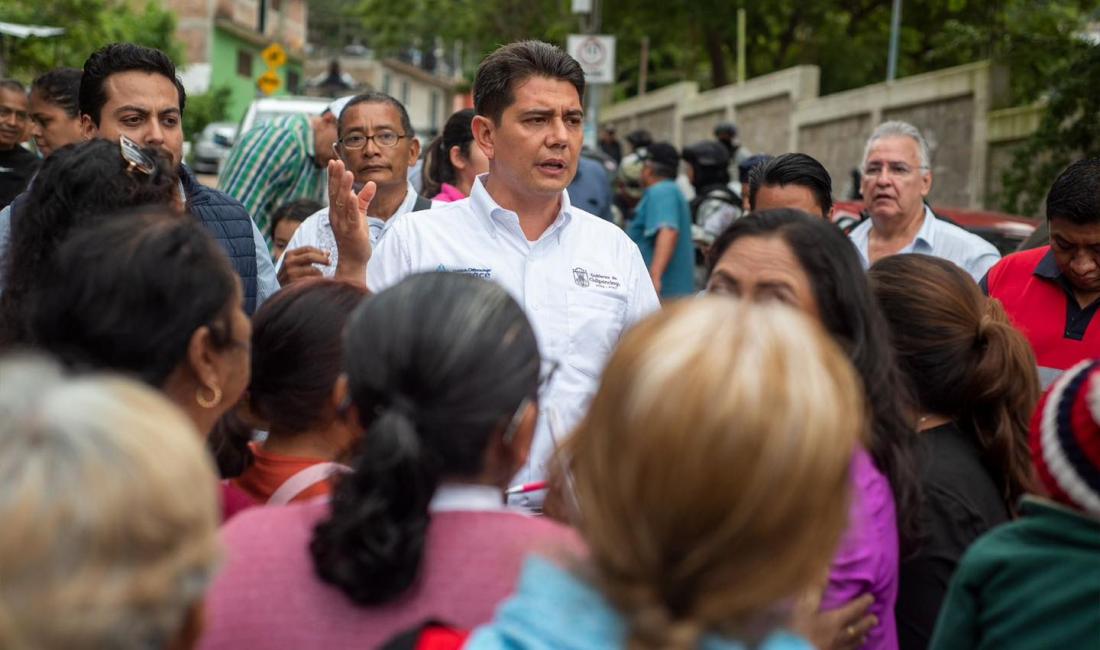Attacks on local officials are the most serious attacks on democracy. Global protection is needed.
Photo credit: The late Mayor Arcos, from his Facebook page.
READ THIS NEWSLETTER IN PORTUGUESE HERE.
To sign up for this free Democracy Local newsletter, please email joe@democracylocal.com. The newsletter is published monthly.
LOCAL DEMOCRACY ISN’T DYING…
It’s being slaughtered. Literally.
When media outlets talk about attacks on democracy, they often are speaking of national leaders who disparage the results of elections. But the more dangerous attack on democracy are threats, violence, and assassinations. And the most common targets are the everyday people who govern local communities.
Some of these attacks are high-profile. On October 16, the state of Israel conducted an air strike on the municipal in the southern Lebanon city of Nabatieh. The attack killed Mayor Ahmad Kahil and 15 other people, many of them municipal staff coordinating aid.
On October 3, the new secretary in Chilpancingo, a city of 280,000 in the state of Guerrero, Mexico, was shot and killed. Three days later, the city’s newly elected mayor Alejandro Arcos was assassinated; video of his severed head displayed on top of a truck were circulated on WhatsApp.
Such news is too easily dismissed, in part because assassinations of local officials are an epidemic in Mexico. In the run-up to June’s elections, at least 37 local candidates were killed. Four mayoral candidates in Guanajuato alone were assassinated.
But the epidemic of attacks on local officials is global. Threats and violence against local officials has become commonplace in the United States, as I have written elsewhere. The Congress of Local and Regional Authorities has held hearings and documented the trend in Europe.
And worldwide, Armed Conflict Local & Data, an initiative for analysis and crisis mapping, documented more than 2,100 incidents of "violence targeting local government officials and institutions" in the year 2022. Of those incidents, more than half involved direct attacks, like stabbings or shootings.
Who will stop it? Not national governments, who may often be behind the attack, as Israel was in Lebanon, or linked to the attackers, as in Mexico, where the ruling party has sought to “hug” the criminal and drug syndicates who assassinate local officials.
And it’s smart to be wary of federal governments who promise to “protect local communities,” since efforts to limit local power are often disguised as protection.
Since this is a global problem, it requires a global solution. Local officials around the world should pool resources and expertise to protect themselves. Philanthropies and NGOs that seek to “protect democracy” should focus more attention and money on protecting local officials, and those engaged in democracy on the local level.
After all, most democracy on this planet is local. If its practitioners are being killed off, democracy will die with them.
OLÁ FROM VALONGO
I’m writing this from Valongo, Portugal, a city of 93,000 just outside Porto in the northern part of the country. Meeting here is the International Observatory for Participatory Democracy, an organization of cities and research centers and other institutions. IOPD brings together from all over the world who work mostly on the local level.
You can’t go anywhere at this free conference’s sites without hearing a story of local governance and innovation. I’ve been intrigued by the “Active Aging Initiative” (explained here on YouTube) from Forum of Expertise in Ramallah, in the West Bank, and by the Defensoras Comunitarias of Cotopaxi, Ecuador, a participatory initiative addressing violence against women in that province.
IS YOUR DEMOCRACY DECLINING, OR IS YOUR NATION-STATE COLLAPSING?
The trouble with annual reports and rankings of democracy around the world is that the rankings look at democracy by nation. And nations are in trouble, regardless of whether they are democratic or not.
A larger, more complete picture of democracy involves looking at all political levels. That shows a story not of decline but of opportunity. Non-electoral forms of democracy are being used more often and more innovatively at the local level. This Democracy Local column looks at the problem of conflating democracy with the nation-state.
WHAT IF PANDAS COULD PARTICIPATE?
The two new pandas at the San Diego Zoo are twice disenfranchised. They are not U.S. citizens and they are not humans. So they'll be confined to the zoo, and not participating in the U.S. elections on November 5.
But why shouldn’t Yun Chuan and Xin Bao be represented democratically? The pandas use our columnist’s imagination to convey their desire to participate.
MORE GREAT STORIES FROM ASIA DEMOCRACY CHRONICLES
If you’re not reading our partners at Asia Democracy Chronicles, you’re missing important democracy analysis and stories. Here are two recent pieces that piqued Democracy Local’s interest so much that we republished them.
Despite suspicions of dirty tactics by the central government, Kashmir's voters went to the polls during legislative assembly elections
How local defamation laws are being used against local journalists in rural Punjab. And then in Eastern
LISTENING PLEASURE
The pioneering Taiwanese digital minister Audrey Tang is interviewed on the Leading podcast.
WORTH READING.
A fascinating paper in Nature on participatory decision-making in China, asks: “Can local democratic decision-making in authoritarian environments increase or pacify civic engagement and government accountability?”
The paper answers yes, by describing an experiment in which “communities were randomly assigned such that citizens in [certain] communities were invited to deliberate and make collective decisions on how local community budgets were allocated through both in-person and online communication channels (participatory budgeting).” Participatory budgeting, the paper found, “increased a wide range of civic-engagement behaviors outside of the budgeting domain 6 months after the start of the intervention.”
Also: How Meta’s new ban on news has impacted a small Canadian town (via the Columbia Journalism Review).
People Powered profiled one of its newest members, Janaagraha Centre for Citizenship and Democracy, based in Bengaluru, India, and how it enhanced participation and governance in India towns.
When can a collective vote in place of an individual? An interesting look at the “noken” system of voting, whereby indigenous leaders in Papua can vote on behalf of their entire community in an election
HOW TO STRENGTHEN NEIGHBORHOOD GOVERNANCE
Democracy Local has begun republishing some of the excellent writing on democracy from the National Civic League. Here’s a piece from Nick Vlahos, deputy director of the league’s Center for Democratic Innovation, on how to strengthen governance of your neighborhood.
Bottoms-up engagement, community intermediaries, and defeating geography are crucial, Vlahos writes.
Related: check out the National Civic League’s new map of the Healthy Democracy ecosystem in the U.S.
SAVE THE DATE EVENT:
One for your calendar for the new year. On January 31 at 7p Pacific time, I’ll interviewing philosopher of democracy Robert Talisse at Book Soup in Los Angeles about Civic Solitude: Why Democracy Needs Distance, the third book in his masterful democratic trilogy.
You also can find the event listing at democracy.community. There are also events around the book in Nashville on December 6, 2024, and in New York City on January 9, 2025.
The first book, Overdoing Democracy: Why We Must Put Politics in Its Place (2019), examined the ways that democratic politics had extended into many venues of life, alienating us from each other.
The second book: Sustaining Democracy: What We Owe to the Other Side (2021), demonstrated how when we stop talking to our democratic opponents, we end up fighting with our friends.
Civic Solitude shows how democracy is about more than engagement and shared action. Democracy requires reflection, and time alone.
This event is free and open to the public. Details on the book are available at Oxford University Press.
DEMOCRACY QUOTE FOR THE ROAD
“The danger is not that a particular class is unfit to govern. Every class is unfit to govern.”
—Lord Acton
LINKS TO LOCAL DEMOCRACY RESOURCES AND PARTNERS
To this list, we’re adding the Global Citizens’ Assembly Network (GloCAN), “a project that explores complex questions related to
organizing and integrating citizen deliberation into
global governance, particularly in areas like climate
action and AI regulation.”
Democracy International and democracy.community
Federation for Innovation in Demcoracy-Europe and FIDE North America
United Cities and Local Governments
International Observatory of Participatory Democracy
ASU Participatory Governance Initiative
Taiwan Foundation for Democracy
National Civic League’s Center for Democracy Innovation




